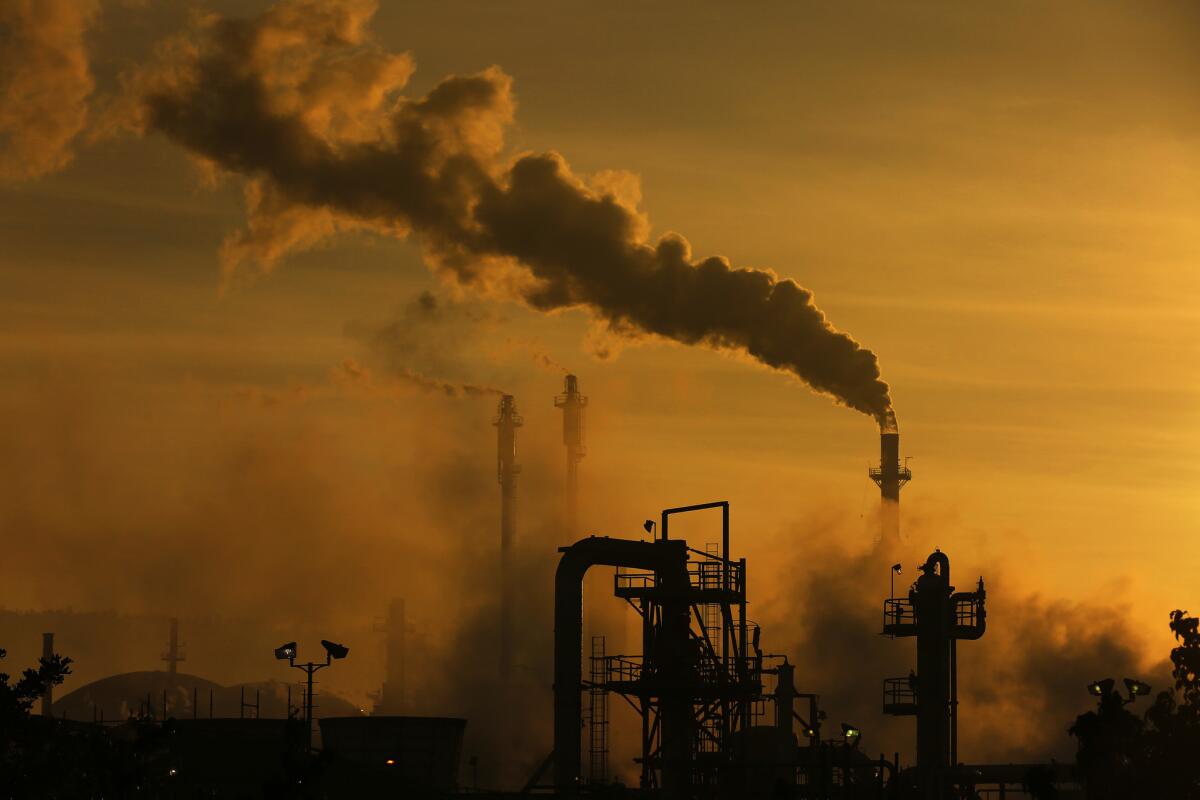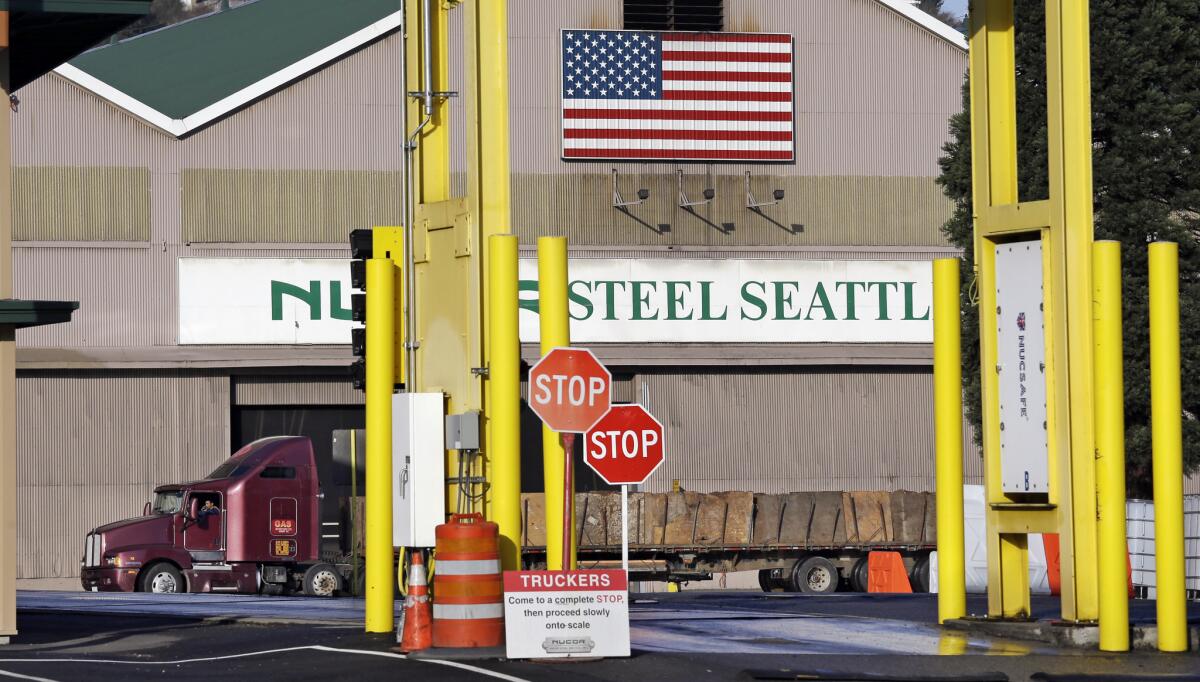How a tax on carbon has divided Northwest climate activists

Reporting from Seattle — On election day, less than a week after the historic Paris climate accord is set to take effect, voters here will have the chance to establish what some experts say would be one of the planet’s most ambitious policies for fighting climate change: the first statewide tax on carbon emissions.
“We’re looking to voters to turn out big in support of this and really set a historic precedent,” said Matthew Anderson, a National Audubon Society vice president for climate. “Getting a price on carbon through this mechanism, getting that on the books in the states, would really shift things significantly.”
It certainly would seem fitting. The progressive Pacific Northwest, evergreen and unencumbered by archaic debates about whether climate change is real, has long viewed itself as the leading edge of sustainability.
Yet whether it will lead the nation this time is far from clear.
The ballot measure, meant to demonstrate the region’s environmental resolve, instead is revealing sharp division among activists over what climate policy should do and who it should benefit — foretelling, perhaps, struggles the rest of America could face as it confronts the challenges of climate policy.
The measure, called Initiative 732, would impose a new tax on fossil fuel emissions from utilities and refineries, reduce the state sales tax by 1%, pay for a tax exemption for low-income households and essentially eliminate the state business and occupation tax. The cuts are intended to make the measure revenue-neutral (though a state analysis says it will not be) in part to win support from conservatives who otherwise might oppose a new tax. Supporters say the tax will speed the shift to clean energy, benefit hundreds of thousands of low-income people and make Washington’s tax code, widely regarded as one of the most regressive in the nation, more fair.
While the campaign has included debate over the merits of a carbon tax versus other ideas, such as a fixed cap on emissions, it has been more striking for exposing the conflicting philosophies among climate activists: Many of its supporters believe bipartisanship is the best route to build a climate coalition, while many of those opposed say it does not do enough to win support from minority and low-income groups, labor unions and other traditionally Democratic groups.
Although the measure gathered more than 350,000 signatures, it has not won support from the region’s most influential environmental groups.
The local chapter of 350.org endorsed the initiative, then “unendorsed” it. The Sierra Club squabbled internally and externally before officially adopting a “do not support” position, though many of its members are likely to vote for the measure. Climate Solutions, a national group based here, wrote a lengthy open letter under the headline “Why we cannot support Initiative 732 but will not actively oppose it.”
Danny Westneat, a columnist for the Seattle Times, was more blunt, calling the situation “a liberal pig pile.”
The more centrist Audubon Society is the only major environmental group to endorse I-732. Support has come from other corners, though.

The Sightline Institute, an environmental think tank, calls the measure “a worthy policy to put Washington on a path to cutting pollution and encouraging clean energy while also helping low-income families by making Washington State taxes less regressive.”
Charles Komanoff, the founder of the Carbon Tax Center, said in an interview that I-732 could provide a “template” for a national carbon tax. The debate here, he said, “is unbelievably vexing and frustrating.” Dozens of prominent scientists from the University of Washington urged approval of I-732, calling it “a bipartisan effort that rejects ideology.”
The fight, however unlikely, has been building for years.
After failing to pass carbon-pricing legislation in Congress in 2010 and in some state legislatures (with success in California being a significant exception), climate groups here and elsewhere began expanding outreach efforts in the belief that the movement was too reliant on traditional environmental organizations. In 2014, they formed the Alliance for Jobs and Clean Energy, which included labor unions and grass-roots groups focused on climate justice.
The Alliance galvanized around three basic goals: pricing carbon emissions in some form, making investments in clean energy and providing services for people most impacted by climate change. They have not finalized a proposal or even settled on a timeline for pursuing it.
Meanwhile, Yoram Bauman, an environmental economist who has worked with Sightline and at the University of Washington, formed Carbon Washington to promote I-732. He modeled the effort on British Columbia, which has the only broadly applicable carbon tax in North America. Debate persists about that tax, but studies show it has helped reduce emissions without hurting the economy.
It also did what supporters of I-732 hope their measure will do: inspire national action. Last week, Prime Minister Justin Trudeau announced that, by 2018, all Canadian provinces must adopt a carbon tax or a cap-and-trade program that achieves similar emissions reductions.
But the carbon tax proposed in Washington is more ambitious because of the degree to which it increases over the years.
Some opponents of I-732 say a cap-and-trade program, similar to the one in California, would be more effective at reducing emissions because it places a firm cap on emissions, rather than relying on pressure from a tax. Gov. Jay Inslee, a Democrat, tried and failed to get a cap-and-trade program through the Washington Legislature last year. He opposes I-732.
Critics also have seized on a state analysis showing that I-732 could create a net loss of about $800 million over six years and cause unintended tax benefits for Boeing, the state’s largest manufacturer.
Bauman and other dispute the analysis. They also say I-732 is far simpler than cap-and-trade — the California program has faced legal and financial challenges — and can be instituted more quickly. The Alliance, they say, is letting a quest for perfection get in the way of a good policy that is in front of them now, playing into the hands of the fossil fuel industry that is spending freely to fight I-732.
MORE NATIONAL NEWS
Clashes erupt in Portland, Ore., over new police rules
The cases might be rare, but these are the killers cops fear most
A high school football team so good that nobody wants to play them anymore
More to Read
Sign up for Essential California
The most important California stories and recommendations in your inbox every morning.
You may occasionally receive promotional content from the Los Angeles Times.











